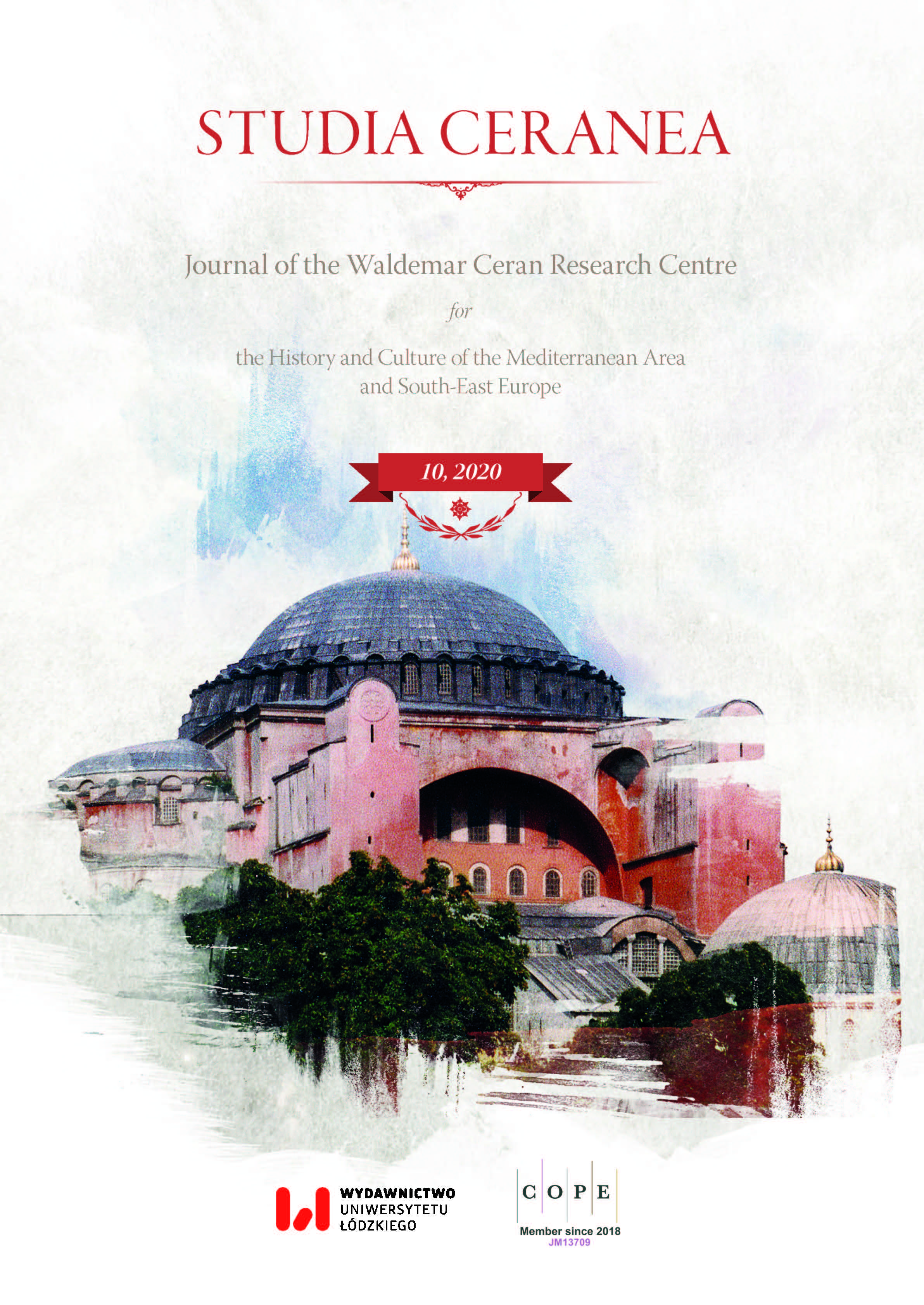Crypto-Christianity and Religious Hybridisation in the Ottoman Balkans: a Case Study (1599–1622)
DOI:
https://doi.org/10.18778/2084-140X.10.09Keywords:
Ottoman Balkans, Catholic missionaries, crypto-Christianity, Catholic confessionalisationAbstract
In this paper I intend to address the issue of crypto-Catholicism in the early Ottoman Balkans, a complex phenomenon which has drawn historians’ attention over the decades. More specifically, I will attempt to define and clarify the difficult and unresolved issue, taking into account the characteristics of the Balkans where many religious and social groups co-existed. That produced interaction and enmeshment between the various religions and, as a result, identities developed specific distinctive traits and often overlapped.
Within that unique Balkan environment – a real confessional melting pot – crypto-Christianity naturally arose. Crypto-Catholics or Orthodoxies, living under Ottoman rule, publicly decided to embrace the Islamic religion but secretly identified themselves as Christians. I have set out to investigate this phenomenon by considering letters and reports produced by Catholic missions involved in the Balkan peninsula.
Downloads
References
Balázs M., Fricsy A., Lukács L., Monok I., Erdélyi és hodoltsági jezsuita missiok, vol. I.1, 1609–1616, Szeged 1990.
Google Scholar
Molnár A., A Chaplain from Dubrovnik in Ottoman Buda: Vincenzo di Augustino and his Report to the Roman Inquisition about the Situation of the Balkan Catholicism, “Dubrovnik Annals” 18, 2014, p. 95–121, https://doi.org/10.21857/m8vqrt05k9
Google Scholar
DOI: https://doi.org/10.21857/m8vqrt05k9
Molnár A., A Dél-Balkán Képe Rómában. Marino Bizzi antivari érsek kéet kiadatlan beszámolója Szerbiáról és Albániáró (1622), [in:] A. Molnár, Kalmárok és Káplánok az oszmán birodalomban. Források és tanulmányok a balkáni és hodoltági katolicizmus 16–17. Századi történetéhez, Budapest 2013.
Google Scholar
Vanino M., Autobiografija Bartola Kašića, Zagreb 1940 [= Građa za povijest književnosti hrvatske, 15].
Google Scholar
Alfieri F., Espellere i «moriscos», [in:] Introduzione alla storia moderna, ed. V. Lavenia, M. Bellabarba, Bologna 2018, p. 335–344.
Google Scholar
Bénat Tachot L., Gruzinski S., Passeurs culturels. Mécanismes de métissage, Paris 2001.
Google Scholar
Biliarsky I., Two Documents Concerning the Matrimonial Relations amongst the Balkan Jews in the Late Middle Ages, [in:] To Be or Not to Be a Jew. On Conversion to or Renouncing Judaism, ed. A. Cornea, M. Stanciu, Bucarest 2014, p. 141–147.
Google Scholar
Chelaru R.-D., Between Coexistence and Assimilation: Catholic Identity and Islam in the Western Balkans (Seventeenth–Eighteenth Centuries), “Revista istorică” 23.3–4, 2012, p. 291–324.
Google Scholar
Collectanea S. Congregationis de Propaganda Fide, seu decreta, instructiones, rescripta pro Apostolicis Missionibus I (1622–1866), Romae 1907.
Google Scholar
Fiume G., La cacciata dei moriscos e la beatificazione di Juan de Ribera, Brescia 2014.
Google Scholar
Gara E., Conceptualizing Interreligious Relations in the Ottoman Empire: the Early Modern Centuries, “Acta Poloniae Historica” 116, 2017, p. 57–91.
Google Scholar
DOI: https://doi.org/10.12775/APH.2017.116.03
Ginzburg C., Il nicodemismo. Simulazione e dissimulazione religiosa nell’Europa del ‘500, Torino 1970.
Google Scholar
Gradeva R., Apostasy in Rumeli in the Middle of the Sixteenth Century, [in:] Rumeli Under the Ottomans: 15th–18th Centuries. Institutions and Communities, Istanbul 2004, p. 287–368.
Google Scholar
Identidades cuestionadas. Coexistencia y conflictos interreligiosos en el mediterráneo (ss. XIV–XVIII), ed. B. Franco, B. Pomara, M. Loma, B. Ruiz, Valencia 2016.
Google Scholar
Korade M., Julije Mancinelli o dubrovačkoj okolici (1575/76), “Vrela i Prinosi” 16, 1986, p. 131–151.
Google Scholar
Krstić T., Contested Conversions to Islam. Narratives of Religious Change in the Early Modern Ottoman Empire, Stanford Cal. 2011.
Google Scholar
DOI: https://doi.org/10.11126/stanford/9780804773171.001.0001
Malcolm N., Crypto-Christianity and Religious Amphibianism in the Ottoman Balkans. The Case of Kosovo, [in:] Religious Quest and National Identity in the Balkans, ed. H. Norris, M. Heppell, C. Hawkesworth, London 2001, p. 91–110.
Google Scholar
DOI: https://doi.org/10.1057/9780230523333_7
Malcolm N., Kosovo. A Short History, New York 1998.
Google Scholar
Molnár A., Confessionalization on the Frontier. The Balkan Catholics between Roman Reform and Ottoman Reality, Roma 2019.
Google Scholar
Molnár A., Le Saint-Siège, Raguse et les missions catholiques de la Hongrie ottomane 1572–1647, Roma–Budapest 2007.
Google Scholar
Ndreca A., L’Albania nell’Archivio di Propaganda Fide, Città del Vaticano 2017.
Google Scholar
Pizzorusso G., Governare le missioni, conoscere il mondo nel XVII secolo. La Congregazione pontificia De Propaganda Fide, Viterbo 2018.
Google Scholar
Reinhard W., Confessionalizzazione forzata? Prolegomeni ad una teoria dell’età confessionale, “Annali dell’Istituto Storico Italo-germanico in Trento” 8, 1982, p. 13–38.
Google Scholar
Reinhard W., Il pensiero politico moderno, Bologna 2000.
Google Scholar
Reinhard W., Stato e modernità, [in:] Le radici storiche dell’Europa. L’età moderna, ed. M.A. Visceglia, Roma 2007, p. 25–37.
Google Scholar
Schilling H., La confessionalisation et le système international, [in:] L’Europe des traitésde Westphalie. Esprit de la diplomatie ed diplomatie de l’esprit, ed. L. Bely, Paris 2000, p. 411–428.
Google Scholar
Schilling H., Confessione e identità politica in Europa agli inizi dell’età moderna (XV–XVIII secolo), “Concilium. Rivista internazionale di Teologia” 6, 1995, p. 970–983.
Google Scholar
Schilling H., From Empires to Family Circles: Religious and Cultural Borderlines in the age of Confessionalisation (with I. G. Tóth), [in:] Cultural Exchange in Early Modern Europe, vol. I, Religion and Cultural Exchange in Europe, 1400–1700, ed. H. Schilling, I.G. Tóth, Cambridge 2007, p. 25–46.
Google Scholar
Schilling H., Konfessionalisierung und Formierung eines internationalen Systems während der frühen Neuzeit, [in:] Die Reformation in Deutschland und Europa. Interpretationen und Debatten, ed. H. Guggisberg, G. Krodel, Gütersloh 1993, p. 597–613.
Google Scholar
Skendi S., Crypto-Christianity in the Balkan Area under the Ottomans, “Slavic Review” 26.2, 1967, p. 227–246.
Google Scholar
DOI: https://doi.org/10.2307/2492452
Stavrianos L.S., The Balkans since 1453, New York 2000.
Google Scholar
Tóth I.G., Missionaries as Cultural Intermediaries in Religious Borderland: Habsburg Hungary and Ottoman Hungary in the Seventeenth Century, [in:] Cultural Exchange in Early Modern Europe, vol. I, Religion and Cultural Exchange in Europe, 1400–1700, ed. H. Schilling, I.G. Tóth, Cambridge 2007, p. 88–110.
Google Scholar
Zefi S., Islamizacija Albanaca i fenomen ljaramanstva tijekom stoljeća (XV.–XX.). Razlozi i stav Katoličke crkve, Zagreb 2003.
Google Scholar
Downloads
Published
How to Cite
Issue
Section
License

This work is licensed under a Creative Commons Attribution-NonCommercial-NoDerivatives 4.0 International License.














